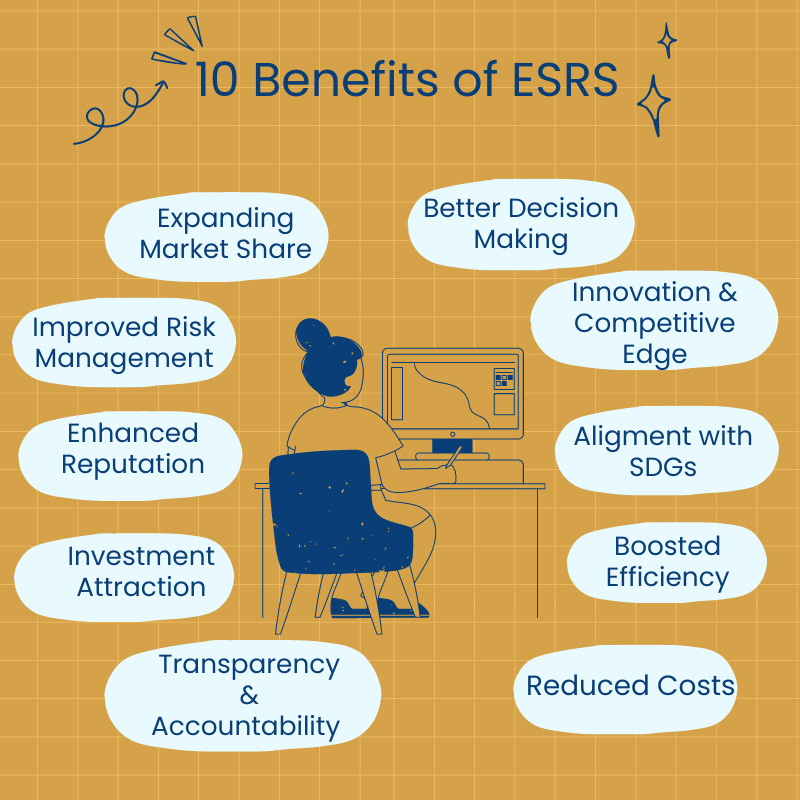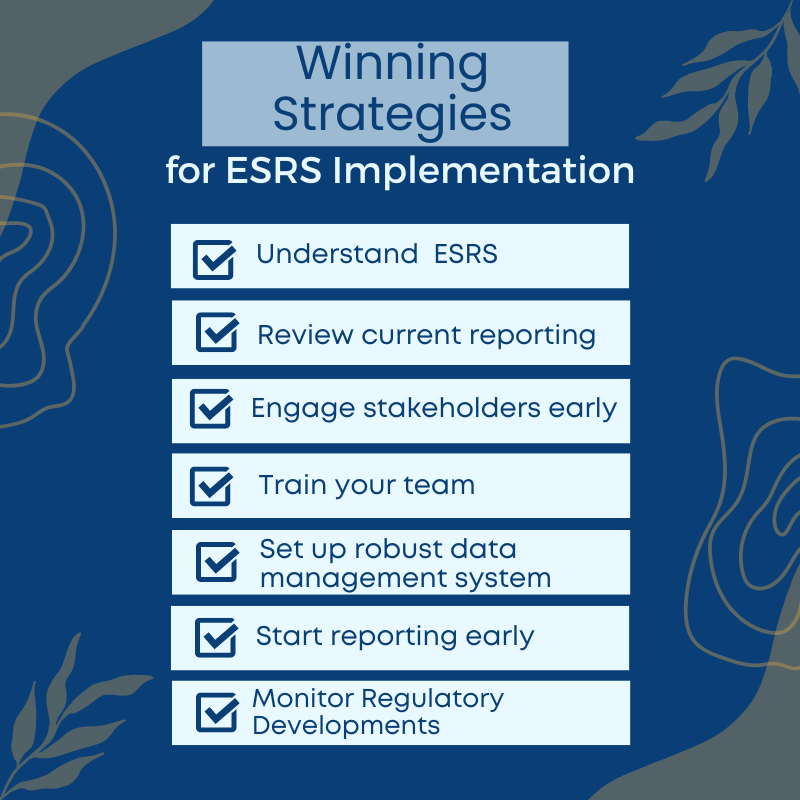10 Benefits of ESRS for Businesses
In our evolving economic ecosystem, sustainability performance is critical. It’s the cornerstone of responsible investment and sustainable business. Central to this paradigm is the European Sustainability Reporting Standards (ESRS). The ESRS framework gives corporations a powerful tool to illustrate their dedication to sustainability and to measure progress towards these sustainable goals.
But what’s in it for your organisation if you decide to adopt the ESRS? Let’s delve into these benefits.

Boosted Transparency and Corporate Accountability
The bedrock of the ESRS lies in transparency. By utilising these standards, corporations can deliver thorough, accurate, and succinct sustainability reports. The amplification in transparency paves the way for trust-building amongst stakeholders – investors, clients, eployees, suppliers, communities, and regulators.
Integral to the ESRS is accountability. These European standards mandate that corporations operating in the EU to disclose their strategies, objectives, and measures for enhancing their sustainability performance. This level of accountability can foster the reputation of a company as an innovative and responsible entity.
Investment Attraction
Today’s investors are keen on integrating ESG (environmental, social, and governance) factors into their investment decisions. Through the application of the ESRS, businesses can offer investors transparent and comparable data required to evaluate their sustainability performance. This might draw in investors, leading potentially to a decrease in the cost of capital.
Additionally, corporations that disclose sustainability impacts, risks and opportunities might appeal to socially responsible investors. Such investors scout for companies contributing to sustainable development while yielding financial returns.
Enhanced Reputation
In the contemporary landscape, a company’s standing is inextricably linked with its sustainability practices. Complying with the European Sustainability Reporting Standards can position a corporation as an accountable corporate entity, amplifying its public image.
This favourable perception can foster customer loyalty, investor trust, and increased stakeholder engagement.
Improved Sustainability Risk Management
The adoption of ESRS enables corporations to recognise and control sustainability risks more effectively. It offers a clear configuration for the identification and disclosure of significant sustainability risks. These risks can vary from environmental threats, such as climate change to social risks like cases of adverse human rights impacts.
By identifying these risks early, corporations can draft strategies to mitigate them, assisting in the prevention of potential damage to their reputation and financial standing. More so, by disclosing these risks, corporations can manifest to investors and stakeholders their proactive approach in managing sustainability concerns.
Expanding Market Share
Corporations that share their sustainability performance candidly tend to be more captivating to consumers and B2B clients, including public procurement entities. An escalating number of consumers and businesses favour buying from socially responsible companies. Through adherence to the ESRS, companies can engage with this growing consumer and customer base, potentially enhancing their market share.
Sparking Innovation and Gaining Competitive Edge
Applying the ESRS can also spur innovation. Analysing their sustainability performance in detail allows corporations to identify areas for improvement and innovation. For example, innovative technologies to minimize GHG emissions. This insight can result in the creation of new offerings or processes that not only advance sustainability performance but also provide a competitive edge.
As sustainability becomes a more prominent factor in the marketplace, businesses demonstrating robust sustainability performance may be able to distinguish themselves from their competitors.
Harmonising with Global Sustainability Goals
The ESRS aligns with global sustainability initiatives such as the United Nations’ Sustainable Development Goals (SDGs) and the Task Force on Climate-related Financial Disclosures (TCFD) recommendations. Adopting ESRS allows businesses to demonstrate their commitment to these global sustainability goals, enhancing their status as responsible corporate citizens and possibly unlocking new business prospects.
Better Informed Decision-Making
ESRS reporting provides data on ESG performance, guiding strategic decisions. This data helps in pinpointing operational strengths and weaknesses, assisting executives in making informed decisions. It encourages corporations to align their strategies with sustainability goals, resulting in resilient, future-proofed business models.
Boosted Efficiency
Sustainability and resource efficiency go hand in hand. ESRS propagates the principle of ‘doing more with less,’ prompting corporations to optimise their resource utilisation. This could lead to process improvements, escalating operational efficiency and productivity.
Reduced Costs
Sustainability frequently correlates with cost savings in the long run. Efficient resource use and waste reduction, catalysed by ESRS compliance, can lead to notable cost reductions. Additionally, proactive management of ESG risks can avert costly incidents and penalties, driving further savings.
Closing Thoughts
Companies will soon implement the ESRS, starting from 2024. Adopting ESRS unlocks a wide range of benefits for corporations. It can heighten transparency and accountability, draw in capital, manage risks, stimulate innovation, and display alignment with global sustainability goals. Hence, it is a valuable tool for any corporation aiming to flourish in the era of sustainable business and responsible investment.
Remember, integrating the ESRS isn’t merely about compliance. It’s about grasping opportunities for sustainable growth, building robust relationships with stakeholders, and contributing to a more sustainable and inclusive economy. So, why delay? Begin discovering the potential benefits of ESRS for your corporation today.
Your Next Step on the CSRD Compliance Journey
Are you ready to spearhead your company’s sustainability journey and stand out from the crowd? The Corporate Sustainability Reporting Directive (CSRD) and European Sustainability Reporting Standards (ESRS) are not only coming but are here, and your next steps are critical.
Mastering the complexities of the CSRD and ESRS can seem like a daunting task. However, overcoming this challenge doesn’t just mean compliance with new laws – it’s an opportunity to show your commitment to a sustainable future, to gain a competitive edge, and to attract stakeholders who value responsibility.
We know it might be overwhelming, but you’re not alone in this journey. Imagine having all the necessary tools, knowledge, and support at your fingertips. That’s where The CSRD Compass steps in. We’re your ultimate guide to everything CSRD and ESRS, offering a rich collection of resources ranging from detailed guides and insightful articles to comprehensive courses and expert analysis. Navigating this new terrain of sustainability reporting has never been easier!
Don’t wait for tomorrow. The time to act is now. Embark on your sustainability reporting journey today, prepare your business for a sustainable future and make a real impact on our planet. Visit The CSRD Compass today, and let’s shape a greener future together!


